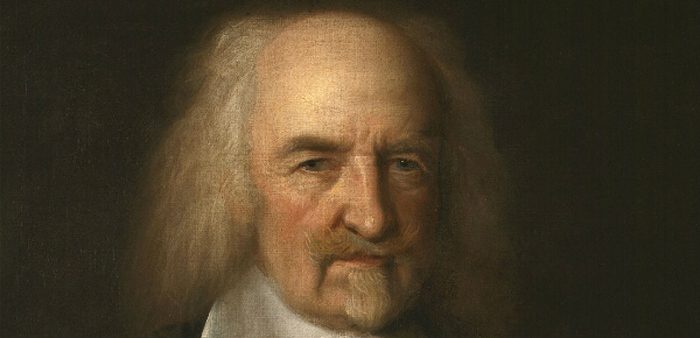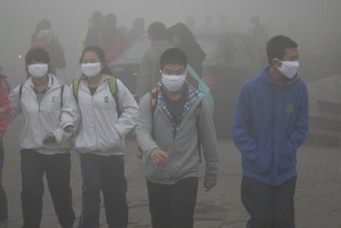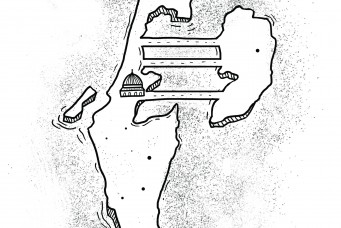On the State of Nature
Hobbes saw life as nasty and brutish, while Rousseau argued humans lack inherent differences in power and strength. A better framework for understanding division in modern politics: Truth Politics versus Power Politics.

Portrait of Thomas Hobbes, circa 1670, by John Michael Wright. National Portrait Gallery London.
Modern political discussion is dominated by the division between Left and Right. Each of us has so internalized this distinction that we often catch ourselves placing new acquaintances or emerging public figures somewhere along the Left/Right spectrum, even in ambiguous cases. We immediately detect when someone makes a misstep by occupying the wrong part of the spectrum at the wrong time: as when our loose cannon uncle praises George W. Bush at a gathering of Arabists, or a student leader talks like Che Guevara before a university board of trustees. The split between Left and Right goes back to the French Revolution, that formative event for all politics ever since. While the Right holds onto the various accretions of history as if they were fragile heirlooms protecting us from anarchy, the Left generally wishes to eradicate such accidents in favor of a political system grounded in an optimistic view of the human character.
Ultimately, these opposing standpoints are motivated by opposite theories of the so-called “State of Nature,” a staple of early modern political theory. The Right’s version of human nature resembles that of Thomas Hobbes’ Leviathan, where life in the State of Nature is famously described as “nasty, brutish, and short.” Pre-civilized existence is a war of all against all, with theft and murder normal daily occurrences, and even the mightiest humans in permanent danger of being clubbed to death in their sleep. Given the horrific prospects of such a world, approached in some respects by the brutal English Civil War of Hobbes’ own era, the paramount need is for order. We should salute nearly any government, no matter how oppressive, as a bulwark against the terrors of the night. Even if we join those commentators who view Hobbes as the founder of liberalism, insofar as he seeks to depoliticize social life for the pursuit of happiness and economic gain, the basic pessimism of Hobbes’ vision is clear. Since even a brutally oppressive regime would be preferable to civil war, the key is that nothing should be regarded as transcending the sphere of the state. Not only religion, but even science must be blocked from claiming access to a superior truth beyond the power of the sovereign. Hobbes himself went so far as to denounce the chemist Robert Boyle to the English government for claiming direct access to the truth of the vacuum.
By contrast, the Left is the heir of Jean-Jacques Rousseau, whose State of Nature features equal human beings who differ initially only by who can sing and dance most impressively around the campfire. In the State of Nature there are no distinctions as to wealth, power, intelligence, strength, or even beauty (since everyone looks equally horrible). The birth of agriculture and metallurgy ended this condition by giving rise to cities, starting us on our long historical march through crushing social hierarchy and bloodthirsty war machines. Though it is no longer possible to return to the initial paradise, overthrowing the tyranny of kings and sultans would be a good start in partially restoring human dignity. While for Hobbes even an oppressive government is still better than the State of Nature, for Rousseau it is infinitely worse. Occasional injustice is not the lesser of two evils, but a morally repugnant outrage that justifies revolution.
Yet there is a different and more important modern political distinction that does not rest on speculations about the State of Nature. I speak of the difference between Truth Politics and Power Politics, both of which come in Left and Right forms. With the former we have those who believe they grasp a political truth grounded in the nature of things, though one which regrettably eludes us due to the stupidity, greed, corruption, or class interests of others. This supposed truth may be the equality of all humans (as for most Marxists) or an eternal hierarchy of unequal human types (as for most Straussians). With the latter category we have the colder view of those who see politics as merely as a battleground of strength, poised somewhere beyond good and evil. The fact that most people are a mixture of the two tendencies does not mean that the pure tendencies do not exist. And here too we find a Right version of Power Politics (as with any Machiavellian tyrant) and a Left version (as with much postmodern identity politics). In one of its milder forms, Power Politics takes the shape of geopolitical realism.
This duality of Truth and Power can often be found in commentary on contemporary events. Let’s consider two present-day views on the motives of Russian President Vladimir Putin. The first comes from an article in the February 14, 2015 issue of the Economist, one of the flagship periodicals of free-market liberal democracy.¹ At times the article presents Putin as merely evil: “The EU and NATO are Mr. Putin’s ultimate targets. To him, Western institutions and values are more threatening than armies. He wants to halt their spread, corrode them from within and, at least on the West’s fragile periphery, supplant them with his own model of governance…[in which] states are dominated by elites, and those elites can be bought.” At other times he is depicted as mentally unstable: “From his tantrums over the Middle East to his invasion of Georgia, and multiple misadventures in Ukraine, Mr. Putin has sometimes seemed to stumble into accidental disputes with the West, driven by a paranoid fear of encirclement.” Ultimately he becomes a dangerous psychotic: “Last year Mr. Putin lopped off Crimea, redrawing Europe’s map by force. The war he hallucinated into reality in eastern Ukraine has killed thousands.” For those left fearful of Russia after reading the Economist’s take on Putin, we can turn to the geopolitical realism of the Stratfor company, which portrays a thoughtful Putin simply playing the hand he was dealt. Where theEconomist sees madness and aggression, Stratfor’s Reva Bhalla sees a clear rationale: “Contrary to popular opinion in the West, Russian President Vladimir Putin is not driven by crazed territorial ambitions. He is looking at the map, just as his predecessors have for centuries, and grappling with the task of securing the Russian underbelly from a borderland state coming under the wing of a much more formidable military power in the West.”² Stratfor founder George Friedman, who takes Russian vulnerability so seriously that he predicts the breakup of the country over the next decade, weighed in as follows after his December visit to Moscow:
I have understood the Russians’ view of Ukraine as a necessary strategic buffer and the idea that without it they would face a significant threat, if not now, then someday… I tried to provide a strategic American perspective. The United States has spent the past century… [trying to prevent] the rise of any single hegemon that might be able to exploit Western European technology and capital and Russian resources and manpower.³
Friedman prefaces this view with a classic realist formula: “I try not to be drawn into matters of right and wrong, not because I don’t believe there is a difference but because history is rarely decided by moral principles.”
But however clear-headed this last utterance may seem, it overstates the realist case. One month earlier, Friedman’s colleague Robert Kaplan described that case as follows: “Though everyone and no one is a realist, it is also true that realism never goes away—at least not since Thucydides wrote The [History of the] Peloponnesian War in the fifth century BC, in which he defined human nature as driven by fear… self-interest… and honor…”⁴ Now, surely it is part of honor to observe basic moral principles and to be known for observing them. Niccolò Machiavelli himself, for all his praise of the Borgia family’s machinations, says of the tyrant Agathocles that “it cannot be called talent to slay fellow-citizens, to deceive friends, to be without faith, without mercy, without religion; such methods may gain empire, but not glory.”⁵ That today’s world leaders are not just calculating realists can be seen from a simple thought experiment. If we were to replace each of these leaders instantly with a purely amoral double, it should be obvious that the world map would change its current form rather quickly, to the advantage of the most powerful states. While the position of the Economist may border on self-righteous, it is hardly out of bounds to judge Putin or other political actors in moral terms as well.
Bruno Latour’s Realization
Rather than brewing a lukewarm mixture of Truth and Power, it seems better to assume that there is something wrong with both positions. In a recent book, I attempted to trace the gradual realization of this point in the career of the French thinker Bruno Latour, who is not usually regarded as a political philosopher.⁶ Latour begins his career as an ardent Hobbesian, merely adding inanimate entities to the political sphere in a way that Hobbes does not, giving inanimate entities the task of stabilizing human society: houses, bank accounts, wedding rings, identity cards. What Latour loves most about Hobbes is his refusal of any transcendent principles, whether religious, scientific, or otherwise. The young Latour despises Truth Politics as a rather pitiful assertion of moral principle by those who do not take the trouble to win. This shifts with his blunt conclusion of 1991: “No, Hobbes was wrong.”⁷ By 1999 he asserts that the polity needs transcendence to prevent it from ignoring the outside world: it is now the job of scientists to detect relevant unknown inanimate entities (climate change, contagious diseases) and the job of moralists to draw our attention to excluded humans (illegal immigrants, the severely disabled).⁸ Truth Politics and Power Politics both share the same defect: both think that they already know how the world works. That is to say, either they already know what a good political system would look like if only it could be implemented, or they already know that truth is an illusion and the world is nothing but a winner-take-all struggle to the death. This ignores that politics at its best admits uncertainty as to the best course of action: a learned uncertainty that Latour credits to the diplomat, one of his favorite figures. This leads Latour at last to an “object-oriented” politics, in which the object is never fully grasped but still organizes political activity anyway: the true factors behind climate change, the prions probably but not definitely responsible for mad cow disease.⁹
One typical feature of object-oriented politics is its claim that political issues arise in intermittent and indeterminate fashion and require the participation of all those affected by it. Whereas the journalist Walter Lippmann saw the frequent ignorance of the American public as a barrier to democracy, John Dewey viewed it more optimistically, as a signal of individual freedom not to be informed about each and every public issue. Instead, each political issue defines its own new public, and each issue remains a subject of controversy and uncertainty for as long as it is with us. Much like Socrates never reaching a final definition of justice or virtue, the democratic public never reaches the final truth of an issue, but also (one hopes) never resorts to brute force alone in dealing with it. Yet the opposite feature also follows. Just as no political issue can ever be thoroughly illuminated, we also cannot let action be delayed indefinitely by the unattainability of direct political knowledge. At some point a decision is needed. And here Latour makes striking use of the right-wing political theorist Carl Schmitt (who is also popular among many Leftists for his anti-liberal view that the political is always violent).
Schmitt is primarily interested in those situations where arguments over right and wrong are no longer relevant, since the parties have embarked on an existential struggle for survival.¹⁰ Latour’s 2013 Gifford Lectures in Edinburgh openly implied that we now have reached this point with climate change: a point where climate change skeptics obviously cannot be convinced, and so must simply be defeated. However entertaining this “Green Schmittianism” might sound, it has alarmed those of Latour’s readers who saw his object-oriented politics, structured by broad but limited participation in never fully definable or resolvable issues, as his more promising political breakthrough. Assuming that this is the case, it would still remain to be seen how an object-oriented politics would shift political discourse away from the oscillating descriptions of Vladimir Putin as either malevolent or admirably rational. If modern political theory is truly dominated by the duality of Truth and Power, it remains to be seen what emerges from the breakdown of this distinction.
It is worth noting two other aspects of Latour’s object-oriented political theory. One is his remarkable degree of respect for politicians, rare among intellectuals. Even before Socrates, philosophers were in the habit of belittling politicians as cynical manipulators with forked tongues and crooked speech. The honest person was supposed to engage in “straight talk,” which the politician seemed inherently unable to provide. According to this model of transparency, the people should speak to their representative (democratically elected or otherwise), who should faithfully express their will, while the people in turn would transparently follow the commands of the government. Yet all this assumes that the will of the people and the orders of the sovereign power are transparently intelligible, though the arts of commanding and obeying involve as much interpretation as art or food criticism. Latour views politics as a continually revived circular motion, a perpetual translation between people and sovereign that has nothing in common with direct knowledge. The second aspect of Latour’s object-oriented political theory is its recognition that political issues follow a trajectory from background to foreground to background: “Political-1” through “Political-5.” Political issues are first vaguely detected and slowly processed as topics for sovereign action long before they become visible as topics for parliamentary dispute, public referendum, or arbitrary decree. Eventually many issues reach the point of Political-5, becoming objects of invisible efficient governance rather than heated dispute. In the days of Louis Pasteur, the origin of illness was a largely political dispute. Ultimately we reached the point when public health and hygiene transcended party boundaries and became largely a management problem, until one day they were reawakened in the resistance of the anti-vaccine movement. Perhaps a half-century from now, today’s charged conflicts over climate change will resemble the relatively unpolitical management of roads and bridges; a century later, maybe the climate will return to the arena of explicit politics. What seems clear is that the time of politics as a purely human concern are giving way to a political entanglement with inanimate beings.
Graham Harman is a distinguished university professor at the American University in Cairo. He is the author of twelve books, most recently Bruno Latour: Reassembling the Political and Bells and Whistles: More Speculative Realism.
- The passages below are cited from “Putin’s war on the West,” Economist, February 14, 2015.
http://www.economist.com/news/leaders/21643189-ukraine-suffers-it-time-recognise-gravity-russian-threatand-counter. - Reva Bhalla, “The Intersection of Three Crises,” Stratfor Global Intelligence, February 24, 2015. https://www.stratfor.com/weekly/intersection-three-crises.
- George Friedman, “Viewing Russia from the Inside,” Stratfor Global Intelligence, December 14, 2015. https://www.stratfor.com/weekly/viewing-russia-inside.
- Robert D. Kaplan, “The Realist Creed,” Stratfor Global Intelligence, November 19, 2014.
https://www.stratfor.com/weekly/realist-creed. - Niccolò Machiavelli, The Prince, trans. W. K. Marriott, ed. R. Dillon (Plano, TX: Veroglyphic Publishing, 2009), 35.
- Graham Harman, Bruno Latour: Reassembling the Political (London: Pluto Press, 2014).
- Bruno Latour, We Have Never Been Modern, trans. C. Porter (Cambridge, MA: Harvard University Press, 1993), 27.
- Bruno Latour, Politics of Nature: How to Bring the Sciences into Democracy, trans. C. Porter. (Cambridge, MA: Harvard University Press).
- Bruno Latour, Modes of Existence: An Anthropology of the Moderns, trans. C. Porter (Cambridge, MA: Harvard University Press, 2013), 327.
- Carl Schmitt, The Concept of the Political, trans. G. Schwab (Chicago: University of Chicago Press, 2007).
Subscribe to Our Newsletter





